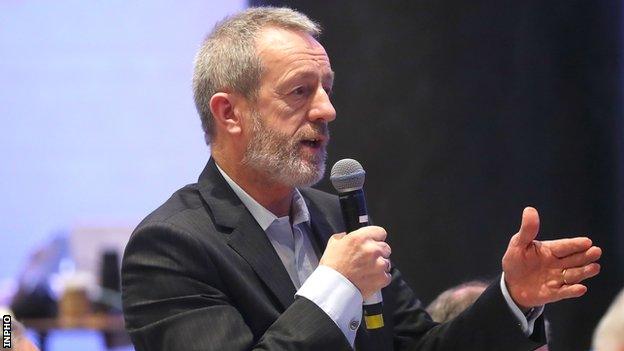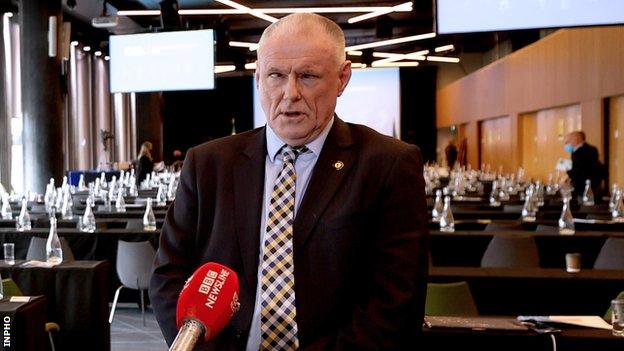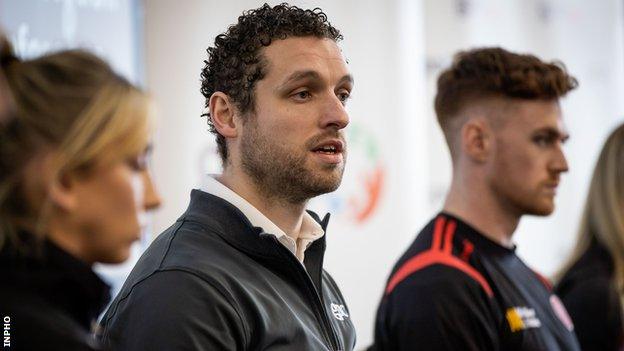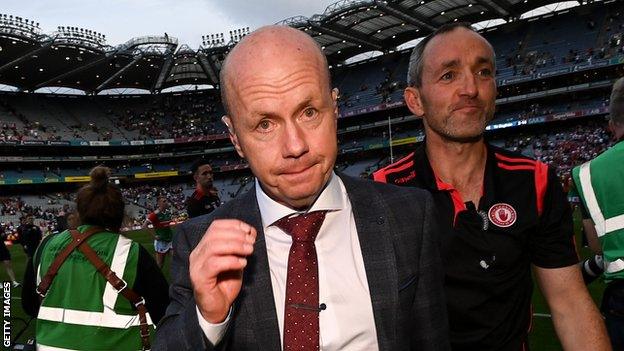GAA Congress: New-look All-Ireland, unification and underage grade changes - what to look out for
- Published

The 'Green Plan' is roughly based on former GAA president Sean Kelly's vision for championship reform
On Saturday, as the National Football and Hurling Leagues gear up for another busy weekend, delegates will gather inside the aptly futuristic setting of the NUI Galway Connacht Air Dome for the GAA's Annual Congress.
If it feels like we've been here recently, it's because we have. This weekend's deliberations in Mayo come just four months on from the autumn Special Congress at Croke Park where Motion 19, better known as Proposal B, was defeated.
That proposal, which promised to introduce a league-based All-Ireland series and end the provincial championships' link with the Sam Maguire Cup, fell short of the 60% majority it needed to pass.
It was radical, but too radical for the provincial bosses who bristled at the thought of their championships being effectively downgraded to pre-season competitions with no link to Sam.
However, following Proposal B's defeat at Croke Park, GAA president Larry McCarthy - who had backed it - said he expected the association to revisit plans to restructure the football championship "very, very quickly".
And so, here we are, four months down the line, with the future make-up of Gaelic football's showpiece competition again under the microscope.
There are, however, a total of 48 motions to be debated and voted on inside the Air Dome on Saturday, so what are some of the key things to look out for? Let's take a look.
All-Ireland to be linked with National League in restructure
'We love snobbery, we love a hierarchy' - Cork boss Ricken on the Tailteann Cup
There is no better place to start than with Motion 1 (or the 'Green Plan'), one of three submitted by Central Council, which centres on reshaping the senior football championship.
The motion, which is roughly based on former GAA president Sean Kelly's vision for reform, is widely expected to pass, and promises to introduce a link between league placings and the championship while maintaining a link with the provincial competitions.
In this new guise, the finalists from each provincial championship would be guaranteed a place in the opening round of the All-Ireland series, which would consist of four groups of four.
The remaining eight places would be filled by the top-ranked teams from the league that do not earn a spot out of their province.
The winners of the Tailteann Cup - the inaugural edition of which takes place this summer - will also qualify automatically (unless they qualify through their province) for the following year, replacing the lowest-ranked county from the league.
Group winners progress straight to quarter-finals while second and third-placed teams contest the remaining four places in preliminary quarter-finals.
The 16 counties who fail to qualify for the All-Ireland series would play in the Tailteann Cup.
The 16 counties to contest the All-Ireland Championship group stage will be made of:
The four provincial champions (1st seeds)
The four provincial runners-Up (2nd seeds)
The next four highest-ranked teams at the conclusion of the National League (3rd seeds)
The next four highest-ranked teams at the conclusion of the National League (4th seeds)
How the group stage will look:
The All-Ireland group stage consists of four groups of four teams
Each teams plays each other once. Two points for a win, one for a draw
Teams who have already met in that year's provincial final cannot be drawn to the same group
Each team shall play one home game, one away and one at a neutral venue
It is not as revolutionary as Proposal B and is certainly not without structural flaws (24 group games will be played to eliminate just four teams), but all indications are that it will be endorsed and given a debut run in 2023.
When speaking to BBC Sport on Thursday, Ulster GAA secretary Brian McAvoy said he was "fairly confident" that Congress will rubber-stamp the new-look championship which, he believes, is a "natural solution" following Proposal B's demise.
"I was one of the strong advocates against it [Proposal B in October]," said McAvoy.
"But I've always said the existing structures aren't perfect and that there was room for a championship that incorporates both the provincial championships and a place for the best league teams in a Sam Maguire knockout stage, and that's what we've got essentially."

Having been a staunch critic of Proposal B, McAvoy says the Green Plan is the "natural solution" to problems within the current championship structure as it maintains the link to the provincial competitions while giving credence to the league
One of the perceived issues with the 'Green Plan' is the continuing link with provincial series, two of which often produce the same winner (Kerry in Munster and Dublin in Leinster).
McAvoy said there can never be a "perfect system" because "we don't live in a world of utopia", but he does not feel as though the provincial competitions are to blame for imbalances in the current system.
"The Ulster Championship is very precious to us, but all the provincial championships are precious too," he added.
"There was no point in throwing the baby out with the bathwater because the imbalance that some saw in the system was not caused by the provincial championships, that was just a manifestation of where it came to be.
"So you weren't actually addressing the root cause of the problem by putting forward that Proposal B.
"I think people have come round and they more recognise that now, and people who were strong advocates of Proposal B have come out in favour of this, including the GPA (Gaelic Players Association), who were very strong supporters of Proposal B and are now four square behind this green proposal."
GAA/LGFA/Camogie Association amalgamation

At a media briefing on Monday, GPA chief executive Tom Parsons said the body will be "relentless" in its pursuit of equality
Speaking of the GPA, they are the driving force behind Motion 33, the latest effort to amalgamate the two women's Gaelic games organisations with the GAA.
The motion, which has gathered significant momentum in the build-up to Congress, "calls on the GAA to prioritise integration with the Ladies Gaelic Football Association (LGFA) and the Camogie Association".
"This motion, if passed, would not result in a change in the rules. One of the functions of Congress is to direct the Association with regard to fundamental policy matters and that's what this in effect will do if the motion is passed."
The motion is the product of an overwhelming desire amongst players - 97% of the GPA's membership approve it - for "equal opportunity, recognition and investment regardless of gender".
On Monday, the GPA held a media briefing in Dublin at which the body's CEO Tom Parsons said the body will be "relentless" in its pursuit of equality.
Tyrone senior footballer Conor Meyler, Galway camogie star Niamh Kilkenny and Limerick hurler Gearoid Hegarty are among the high-profile players to have thrown their weight behind the motion.
Several GAA presidents have endeavoured to bring the three governing bodies together under one umbrella over the years, but given the clear appetite for change in the current landscape, it would be a surprise if a significant step towards unification isn't taken on Saturday.
Underage grades

Errigal Ciaran, the club of Tyrone great Peter Canavan, is calling for counties to have the freedom to determine their own underage grades
Age grades and player pathways will feature prominently during Saturday's gathering in Mayo, with Central Council putting forward a motion that proposes the All-Ireland Minor and U20 football and hurling championships be set aside for an under-19 grade on a three-year trial basis from 2023 to 2025
Meanwhile, Errigal Ciaran - Tyrone great Peter Canavan's club - is one of several clubs supporting Motion 39 which, if passed, would enable counties to determine their own underage grades for clubs.
If Motion 39 is passed, counties would be free to revert to an under-14, under-16 and under-18 structure in the hope that it will aid player development and smoothen the pathway from underage to adult level.
Elsewhere, delegates will consider Motion 27: the permanent adoption of the black card/penalty in hurling for preventing a goal-scoring opportunity, but restricting the goal-scoring opportunity area to inside the 20-metre line and not within 25 metres of each sideline or within the semi-circular arc.
Laois club Rathdowney-Errill have submitted Motion 34, which advocates that all players who wish to participate in an adult championship match must undertake "alcohol, gambling and substance abuse and anti-doping education in that championship year or the preceding one".
Racist and sectarian behaviour forms the basis of Motion 46, which aims to increase the penalty for such conduct towards an opponent or match official from two matches to a minimum 48-week ban, while Motion 47 proposes allowing a second player to join the captain for trophy presentations to amalgamated teams.